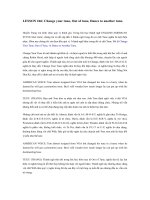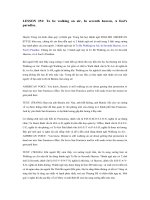Tài liệu dictionary real estate doc
Bạn đang xem bản rút gọn của tài liệu. Xem và tải ngay bản đầy đủ của tài liệu tại đây (140.24 KB, 23 trang )
Abatement
[1] An official reduction or invalidation of an assessed tax value after the initial assessment. [2] The
termination of a nuisance. [3] The correction of an unlawful or unsafe building condition.
Absorption Rate
The rate at which properties offered for sale or lease are successfully marketed or anticipated to be
sold - generally used in forecasting sales.
Abstract (Of Title)
A summary of the public records that identifies transfers, conveyances, and other facts used as
evidence of title including documents, liens, or judgments that may impair title. If there are any title
defects, they must be cleared before a buyer can purchase and receive marketable, insurable title.
Acceleration Clause
A clause in a mortgage note or loan contract that allows the lender to [1] speed up the rate at which
your loan comes due -or- [2] to demand immediate payment of the entire balance of the loan in the
event of default.
Adjustable Rate Mortgage (ARM)
A mortgage in which the interest rate is adjusted periodically based upon an index. Also referred to
as the renegotiable rate mortgage or variable rate mortgage.
Adjustment Interval
On an adjustable rate mortgage, the time interval between changes in the interest rate and/or
monthly payment.
Agreement of Sale
A contract in which a seller agrees to sell and a buyer agrees to buy, under specific written terms
and signed by both parties. Usually referred to as a contract of purchase, purchase agreement, or
sales agreement according to jurisdiction.
Air Rights
The property rights associated with the control, regulation, and use of air space above a tract of real
estate.
Amortization
[1] The retirement of a debt and/or capital recovery through scheduled repayments. [2] Loan
payment calculated to pay off the debt at the end of a fixed period, including interest on the
outstanding balance.
Annual Percentage Rate (APR)
The cost of credit as a yearly rate.
Appraisal
An opinion of the value of property, made by a professional appraiser.
Assemblage
Combining two or more parcels into single ownership or use. Usually to increase highest and best
use of the land.
Assumption
1
The agreement between buyer and seller where the buyer takes over the payments on an existing
mortgage from the seller. Assuming a loan can usually save the buyer money since this is an
existing mortgage debt.
Balloon (Payment) Mortgage
Usually a short-term fixed-rate loan that is not fully amortized at maturity. Smaller initial payments
are made with a large lump sum (balloon) payment due at maturity.
Band Of Investment
A technique used to derive a weighted average "rate of return" on a total investment. Uses the cash
flow rates attributable to the components of a capital investment.
Base Rent
The minimum rent stipulated in a lease agreement.
Binder or "Offer to Purchase"
A preliminary agreement between a buyer and seller to purchase real estate. A binder with earnest
money deposit, that secures the right to purchase real estate upon agreed terms for a limited period
of time. If the buyer changes his mind or is unable to purchase, earnest money is forfeited unless the
binder expressly provides for a refunded.
Broker
An individual who acts as an intermediary bringing together two or more parties in a market
transaction.
Bridge Loan
Short term financing between the termination of one loan and the commencement of another.
Examples: construction/permanent loans, temporary loans used for acquiring and rehabilitating
properties prior to sell or conversion to a permanent mortgage.
Building Capitalization Rate
A rate that converts building income into value - the ratio of building income to value. Usually
applied in residual or band of investment techniques.
Building Line or Setback
Distances from the front, rear, or sides of a lot beyond which construction may not extend.
Setbacks may be established by a filed plat of a subdivision, restrictive covenants in deeds or
leases, building codes, or by public zoning ordinances.
Buydown
A lump-sum payment to a lender that reduces the interest rate and/or payments of the borrower.
Buyer's Market
A market phenomenon that exists when prices are relatively low and buyers have an advantage;
usually due to [1] an oversupply of properties or [2] limited buyer pool.
Cap - (Interest)
A limitation on the amount the interest rate (on an adjustable rate mortgage) may change per year
and/or over the life of the loan.
Cap - (Payment)
2
A limitation on the amount monthly payments (on an adjustable rate mortgage) may change.
Capitalization
A process of converting income to value. (See also direct capitalization and yield capitalization).
Caveat Emptor
Let the buyer beware - a maxim of common law stating that the buyer purchases at his/her own risk.
Certificate of Title
A certificate (issued by a title company or a written opinion provided by an attorney) of ownership
stating that the seller has good marketable and insurable title to the property which he is offering for
sale. The certificate of title offers no protection against hidden defects. The issuer of a certificate of
title is liable only for damages due to negligence.
Chain Of Title
A historical record of all encumbrances and conveyances which affect a property title. Extends from
the time original patent was granted (aka abstract of title).
Closing
The settlement/transfer between buyer, seller and lender where the property and funds legally
change hands.
Closing Costs
Funds required for settlement - usually includes a loan origination fee, points, appraisal fee, title
search and insurance, survey, taxes, deed recording fee, credit report charge and other costs
assessed at settlement. Typical closing costs are 2 to 6 percent of the mortgage amount.
Cloud (On Title)
An encumbrance or outstanding claim that negatively affects the marketability of title.
Collateral
Property pledged as security for a loan that can be seized in event of default.
Commission
Compensation paid to a real estate agent or broker for finding a buyer and/or tenant and
successfully completing the sale.
Commitment Fee
The fee a borrower pays to the lender who agrees to make a loan at some future date. Usually
expressed as a percentage of the anticipated loan amount.
Commitment - Loan
A written agreement between lender and borrower to loan money at a future date subject to the
stated conditions.
Common Area
Any area within a property that is available for common use by all owners, occupants, or their
invitees and not designated for sale or rent. Examples include parking, side- walks, landscaped
areas, exterior of buildings in condo projects, etc.
Condemnation
3
[1] A determination by a governmental agency that a particular building is unsafe or unfit for use. [2]
The act or process of enforcing the governments right of eminent domain.
Condominium
Individual fee simple ownership of a unit (in a multiunit development) and an undivided interest in the
common areas and facilities which serve the project.
Conservation Easement
A restriction limiting the future use of a property to preservation, conservation, or a wildlife habitat.
Consistent Use
The concept that land cannot be valued on the basis of one use while improvements are valued on
the basis of another. Example: a residential dwelling in a commercially zoned area - the land cannot
be valued commercially then add the value the home as a dwelling. It must either be valued as a
home and residential lot (interim use) or be valued as a commercial site offset by demolition
costs. See Highest & Best Use.
Construction Loan
A short term interim loan for financing the cost of construction and usually repaid with the proceeds
from a permanent mortgage. The lender advances funds to the builder as the work progresses.
Contract Rent
The actual rental payments specified in a lease.
Conventional Loan
A mortgage that is neither insured or guaranteed by an agency of the federal government. A
conventional loan may be privately insured.
Cooperative Ownership
An apartment building or a group of dwellings owned by a corporation in which the stockholders are
the residents. It is operated for the benefit of the residents by their elected board of directors. In a
cooperative, the corporation/association holds title to the real estate. Residents purchase stock in
the corporation thereby entitling them to occupy a unit in the building. Although residents do not own
their units, they have an absolute right to occupy their unit for as long as they own the stock.
Credit Ratio
A ratio (expressed as a percentage) used by lenders to judge a borrower's repayment ability. Long
term monthly payment obligations are divided by net income (FHA/VA loans) or gross monthly
income (Conventional loans).
Credit Scoring System
A statistical system used to rate the credit worthiness of a loan applicant according to various
characteristics.
Curable Functional Obsolescence
An element of accrued depreciation. A curable defect in the structure, materials, or design.
Deed
A formal written instrument that transfers title to real property from one owner to another. Parties
include the grantor (seller) and grantee (buyer). The deed should contain the following: [1] a
4
complete legal description, [2] signatures of all parties holding an interest in the property and [3]
witnesses to the conveyance. The conveyance becomes valid when executed and delivered at
closing. (See deed of trust, general warranty deed , quitclaim deed , and special warranty deed.)
Deed of Release
A legal instrument by which the property securing a mortgage is absolved from the lien of the
mortgage. Must be subscribed and acknowledged by the mortgagee (lender). Can be a partial or
whole release.
Deed of Trust
A legal instrument that conveys property title to a trustee. In many states (including North Carolina)
this document is used in place of a mortgage to secure the payment of a note.
Deed Restriction
A limitation that passes with the transfer of property title regardless of the owner. It usually limits the
type or intensity of use of the property.
Default
Failure to repay a loan or otherwise meet the terms of your credit agreement.
Deferred Interest
See Negative Amortization.
Deferred Maintenance
Repairs that should be corrected immediately (curable, physical deterioration).
Deficiency Judgment
A judgment awarded in a suit initiated to recover the difference between a legally imposed
indebtedness and the money received from a foreclosure sale of the debtor's assets.
Delinquency
Failure to make payments on time. May result in foreclosure.
de minimis PUD
A planned unit development (PUD) that has relatively minor common areas and improvements. A
de minimis PUD [1] cannot include any multi-dwelling units that represent the security for a single
mortgage; [2] cannot be a building conversion, [3] must not have any common areas other than
greenbelts, private streets & parking, tot lots & playgrounds, etc., and [4] must not be subject to
additional phasing or annexation that would result in the inclusion of significant common areas.
Department of Housing and Urban Development (HUD)
The federal government's department responsible for major housing and urban development
programs. (urban renewal, low rent public housing, mortgage insurance, metropolitan planning,
etc.) Created in 1965, it replaced the Housing and Home Finance Agency.
Department of Veterans Affairs (VA)
An independent agency of the federal government which guarantees long-term, low- or no-down
payment mortgages to eligible veterans.
5
Depreciation
Decline in value of a house due to wear and tear, adverse changes in the neighborhood, or any
other reason.
Direct Capitalization
[1] A valuation method used to convert a single year's income expectancy (or an annual average of
several year's income expectancies) into a value estimate. [2] A capitalization technique that
utilizes capitalization (cap) rates and multipliers extracted from sales to provide a value estimate.
Yield and value change are implied but not identified.
Direct Costs
Labor and materials costs necessary to construct a new improvement.
Direct Reduction Mortgage
A mortgage loan repaid in periodic (usually equal) installments that includes a repayment of part of
the principal and interest due on the unpaid balance.
Disclosures
Information that must be provided consumers about their financial dealings.
Discount Points
Prepaid interest assessed at closing by the lender. Each point is equal to 1 percent of the loan
amount (e.g. two points on a $100,000 mortgage would cost $2,000).
Discount Rate
[1] The term used to explain the compound interest rate used in the in approach to value to convert
expected future cash flows into a present value. [2] A benchmark for interest rates - the rate charged
by the Federal Reserve System on overnight loans to banks. An increase in the rate not only
discourages borrowing, but it also serves as a signal to the money market that interest rates are
probably going to increase. Accordingly, interest rates charged by banks to customers usually
increase as a result of an increase in the discount rate.
Discounted Cash Flow Analysis
A valuation technique that specifies [1] the quantity, variability, timing, duration of periodic income,
and [2] the quantity/timing of the reversion (sale of property) then discounts these cash flows at a
specified yield rate to derive a present value estimate.
Documentary Stamps
A State tax, in the forms of stamps, required on deeds and mortgages when real estate title passes
from one owner to another. The amount of stamps required varies with each State.
Down Payment
Money paid to make up the difference between the purchase price and mortgage amount. Down
payments usually are 10 percent to 20 percent of the sales price on Conventional loans, and no
money down up to 5 percent on FHA and VA loans.
Downzoning
A government action in which the allowable density for a development is reduced, e.g., fewer
housing units, number or size of buildings, or changes from a high use to a lower use, e.g.,
multifamily to single family.
6
Due-On-Sale Clause
A provision in a mortgage or deed of trust that allows the lender to demand immediate payment of
the balance of the mortgage if the mortgage holder sells the home. This clause prohibits an
assumption of the note by a new buyer.
Earnest Money
Money given by a buyer to a seller as part of the purchase price i.e., a monetary binder to or assure
payment and completion of the sale.
Easement
A interest in real property that conveys use but not ownership of a portion of the property. An
electric company or sewer line crossing private property is a common example.
Easement By Prescription
The right to use another's land established by exercising this right over a period of time. Not
specifically granted but understood. (aka prescriptive easement)
Easement In Gross
An easement that does not attach or run appurtenant with the land.
Economic Life
The period of time that improvements contribute to value. Can be shortened by a change in zoning
such as from residential to commercial e.g., commercial land values exceed the combined value of
the land and home as a residential dwelling. (See Consistent use.)
Effective Age
The age indicated by the observed/perceived condition and utility of a structure (as opposed to
chronological/actual age).
Effective Gross Income
Anticipated income from operation of the real estate after deduction for vacancy and collection loss.
Effective Gross Income Multiplier
A ratio that compares sale price or value to a single year's EGI (effective gross income) expectancy
or an annual average of several years' EGI expectancy. EGIM = Sale Price/EGI.
Efficiency Ratio
The ratio between a building's net rentable area (tenant occupied space) and its gross area
including the building core and common areas.
Eminent Domain
Government's right to take private property for public use upon payment of "just compensation".
Encroachment
An obstruction, building, or part of a building that intrudes beyond a legal boundary onto neighboring
private or public land, or a building extending beyond the building line.
Encumbrance
A legal right (or interest in land) that affects a good or clear title and diminishes the land's value or
use. Encumbrances include zoning ordinances, easement rights, claims, mortgages, liens,
charges, a pending legal action, unpaid taxes, or restrictive covenants. Encumbrances do not
7
prevent the legal transfer of property. They are usually revealed through title search.
Equal Credit Opportunity Act (ECOA)
A federal law requiring lenders and other creditors to make credit equally available without
discrimination based on race, color, religion, national origin, age, sex, marital status or receipt of
income from public assistance programs.
Equity
The difference between the fair market value and any outstanding indebtedness against the
property.
Equity Capitalization Rate
An income rate that reflects the relationship between a single year's cash flows (or an annual
average of several year's pre-tax cash flows) and the owner's equity investment (aka equity
dividend rate, cash on cash rate, or cash flow rate). Used in Direct Capitalization to convert cash
flows into an equity value indication.
Equity Yield Rate
The annualized rate of return on equity capital. Includes "return on" and "return of" the investment.
Escheat
Government's right of titular ownership of property when its owner dies without a will or any known
heirs.
Escrow
Refers to a neutral third party who carries out the instructions of the buyer and seller to handle all
the paperwork of settlement or "closing." Escrow could also refer to an account held by a lender into
which a homebuyer pays money for tax or insurance payments.
et al
And others.
Exclusive Right To Sell
A contract to sell property that specifically states that the listing agent collects a commission
regardless of who sells the property, including the owner.
External Obsolescence
A defect (usually incurable) outside the property that negatively affects value. (An element of
accrued depreciation). Examples include heavy traffic on a residential street, commercial
businesses encroaching into a residential neighborhood, etc.
Fannie Mae
See Federal National Mortgage Association .
Farmers Home Administration (FmHA)
Provides financing to farmers and other qualified borrowers who are unable to obtain loans
elsewhere.
Federal Home Loan Mortgage Corporation (FHLMC)
Also called Freddie Mac, is a quasi-governmental agency that purchases conventional mortgages
from insured and uninsured depository institutions, HUD, and VA approved mortgage bankers.
8
Federal Housing Administration (FHA)
A government agency that promotes homeownership, renovations, and the remodeling of
residences by issuing government guaranteed loans to homeowners. Its main activity is to insure
residential mortgage loans made by private lenders and to set underwriting standards.
Federal National Mortgage Association (FNMA)
Also known as Fannie Mae. Created by Congress, it is a Corporation that purchases and sells
conventional residential mortgages bought from banks, trust companies, S & L's, mortgage
companies, and insurance companies, as well as those insured by FHA or guaranteed by VA.
FNMA facilitates liquidity in the market by providing funds for one in every seven mortgages.
Fee Simple
Absolute ownership not encumbered by any other interest or estate and subject only to the four
powers of government; [1] taxation, [2] escheat, [3] eminent domain, [4] police power.
FHA Loan
An insured loan made by the Federal Housing Administration - open to all qualified home
purchasers. FHA limits the size of loans but limits are usually sufficient to handle moderately priced
homes most anywhere in the country.
FHA Mortgage Insurance
A fee (up to 3% of the loan amount) paid at closing or a portion added to each monthly payment of
an FHA loan, to insure the loan with FHA. FHA mortgage insurance also requires an annual fee of
0.5 % of the current loan amount.
First Mortgage
A mortgage that has priority over all other liens.
Foreclosure
A legal process in which a lender forces the sale of property to recover all or part of the defaulted
loan proceeds.
Freddie Mac
See Federal Home Loan Mortgage Corporation.
Functional Obsolescence
See Curable functional obsolescence and Incurable functional obsolescence.
General Warranty Deed
A covenant/warranty in the deed that binds the grantor and heirs to defend the title against the
lawful claims of all persons. It conveys not only all the grantor's interests but also warrants that if
the title is defective or has a "cloud" on it (tax liens, title claims, judgments, mortgages, mechanic's
liens, etc.) the grantee may hold the grantor liable.
Gentrification
A market phenomenon in which middle and upper class buyers purchase neighborhood properties
and renovate or rehabilitate them.
Gift Deed
A deed given or conveyed without consideration.
Going-Concern Value
9









